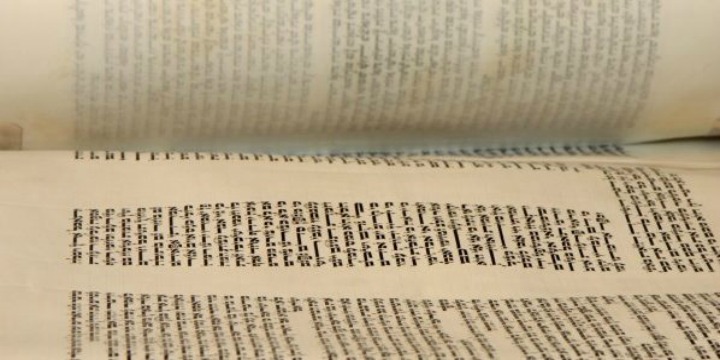A Torah scroll. Photo: RabbiSacks.org.
Anyone interested in history will know that the Yalta Conference was a meeting between the leaders of the United States, Britain, and the Soviet Union that took place in February 1945 towards the end of the Second World War. There is a famous photograph of Roosevelt and Stalin sitting next to an unhappy Winston Churchill, who realized he was being marginalized. As we now know, Stalin suckered Roosevelt into believing him to be someone that could be worked with, when he was actually a murderous fanatic. And it seems so far that Putin is going to sucker Trump over Ukraine, and I fear Iran will too.
Like Roosevelt, Trump wants a deal. But as Barack Obama has shown, naive appeasement is the road to disaster. Only time will tell if the case with Iran is going to be another example.
But here, by way of distraction, I am writing about a person. This Yalta was a distinguished lady from a noble and wealthy family who lived in Babylon between the end of the Second and the Third centuries. She had a strong sense of self-worth, and self-confidence in an era of almost total male dominance. She was, according to Rashi, the daughter of the Exilarch, the head of the Jewish community in Babylon. She was familiar with Jewish law. But she had a temper. When she thought she was being slighted, she smashed four hundred barrels of wine after a guest offended her and women in general (TB Brachot 51b.)
Yalta showed her expertise in kashrut matters. In a debate that hinted at current questions of what constitutes meat if it is produced artificially, she asked her husband about kosher food that would taste like meat cooked in milk. She argued the halachic case expertly. And he accepted the argument (TB Chullin 109b). She also argued the law in other matters such as purity.
Yalta was a doctor too. She personally took Rav Amram to the bathhouse to soak in hot water for a cure when he was stricken with an unknown disease (TB Gittin 67b). And she offered her husband counsel on how to deal with someone who was arguing with him disrespectfully (TB Kidushin 70b). Perhaps these were not in themselves major issues — but they were indicative of her importance in that society, where the only chance women had beyond the home depended either on independent wealth or a compliant husband.
The more famous Talmudic woman however, was Bruria, the daughter of the saintly Chaninah Ben Teradion (an outstanding scholar, from a very wealthy family and martyred by the Romans). She was the wife of Rebbi Meir, who lived in Israel during the second century CE. He is the third most frequently mentioned rabbi in the Mishnah.
She was admired for her breadth of knowledge. She was said to have learned 300 laws from the rabbis on a single cloudy day (TB Pesachim 62b) and was happy to challenge rabbis she thought less knowledgeable than she was. She was also renowned for her sharp wit and often caustic jibes, attacking males for underestimating women. Rebbi Meir was sorely troubled by local louts and prayed that they should die. Bruria argued that he should rather pray that evil disappear. Not people.
The third important woman is Rav Chisda’s daughter. Her actual name is never mentioned. She was gifted with the power of prophecy. She predicted her marriage to her father’s two students (consecutively). First, she was the wife of the Rami Bar Chama, and after his death she married Rava (both were Amoraim of the third generation). She is mentioned many times in the Talmud and commentaries in the Talmud and its commentaries only as “the daughter of Rav Chisda.” The Talmud (TB Bava Batra 12b) says she sat on her father’s lap as he taught Torah in the academy and taught her and her sisters Torah and laws, personally. There were rabbis in those days and later who recognized the value of female scholarship and empowerment — even in times when the rest of the world resolutely refused to encourage it.
Right now, we need people who demonstrate leadership through creativity and flexibility. Most are being silenced by the plague of conformity and the fear of stepping out of line. But the reality is that more and more women within the Orthodox world are studying to the highest levels and making their mark. There are signs of their campaigning to achieve political power too. More power to their elbows (so long as they are covered of course)! You can’t keep a good woman down forever. And more young men are volunteering to serve in the army.
Trump seems to have learnt the lesson of Yalta. But will his natural desire for a long-term deal end up with his being suckered by Iran’s ideology of deceit to achieve victory? Time will tell. Meanwhile, I pray Israel will take a long hard look at its divisive politics.
The author is a writer and rabbi, currently based in New York.
The post Examining Three Remarkable Women From Jewish History in These Turbulent Times first appeared on Algemeiner.com.
Click this link for the original source of this article.
Author: Jeremy Rosen
This content is courtesy of, and owned and copyrighted by, https://www.algemeiner.com and its author. This content is made available by use of the public RSS feed offered by the host site and is used for educational purposes only. If you are the author or represent the host site and would like this content removed now and in the future, please contact USSANews.com using the email address in the Contact page found in the website menu.








